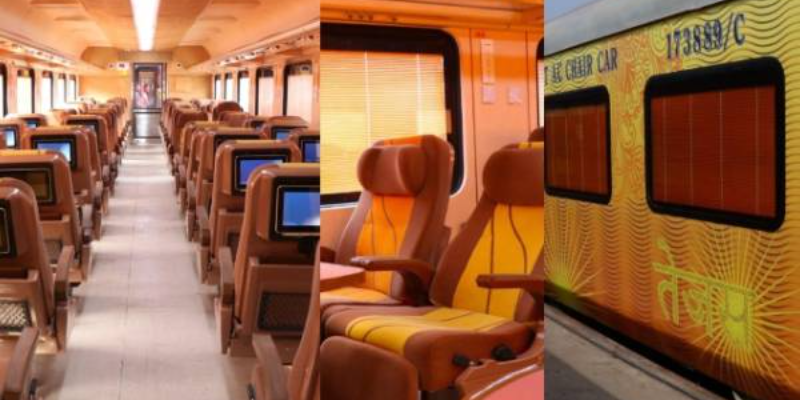- +91 9428399374
- info@mybesttrip.in

The Tejas Express is Indias first semi-high speed fully air-conditioned train Introduced by Indian Railways. It features modern onboard facilities with doors which are operated automatically. Tejas means "sharp", "lustre" and "brilliance" in many Indian languages. These trains are among the fastest trains in India along with Rajdhani Express, Gatimaan Express, Shatabdi Express, Vande Bharat Express and Duronto Express and get the highest priority on the Indian railway network.
The inaugural run of Tejas Express was on 24 May 2017 from Mumbai Chhatrapati Shivaji Maharaj Terminus to Karmali, Goa. It covered 552 km in 8 hours and 30 minutes. On 1 March 2019, second Tejas Express of the country was flagged off between Chennai Egmore and Madurai Junction by Prime Minister Narendra Modi. It covered 497 km in 6 hours and 30 minutes.
Tejas Express on New Delhi - Chandigarh route is expected to commence its services soon after its first announcement in 2016 whereas the Lucknow - New Delhi route running currently as the train has been included in the current Trains at Glance, the official train time-table booklet, with "Date of Introduction to be declared" condition and at the same time news websites have quoted railway officials saying a hold of three years. Meanwhile, the train service which was expected to be launched on Mumbai - Surat route has also been put on hold.
Lucknow – New Delhi Tejas Express, which was inaugurated on 4 October 2019, is Indias first train operated by private operators, IRCTC, a subsidiary of Indian Railways.
The Ahmedabad-Mumbai Tejas express, also operated by IRCTC was inaugurated on the 17 January, 2020.
The coaches of first Tejas Express of India, which runs between Chhatrapati Shivaji Maharaj Terminus, Mumbai and Karmali are manufactured at Rail Coach Factory, Kapurthala in Kapurthala district of Punjab. The coaches of second Tejas express, which runs between Chennai Egmore and Madurai, were manufactured at Integral Coach Factory, Chennai. The train is designed to run at a maximum speed of 200 km/h (120 mph) but the maximum operating speed allowed is 130 km/h (81 mph) due to track and safety constraints. Presently, the train runs at an average speed of 65 km/h (40 mph).
There are 14 non-executive chair cars and they can seat up to 72 passengers each in 3+2 configuration. The coaches have energy-efficient LED lights and digital destination display boards. It also has two executive chair cars in 2+2 configuration. The executive chair cars have a seating capacity of 56 passengers with adjustable head-rests, arm support and leg support. Leg support is not available in non-executive chair cars.
Coaches have bio-vacuum toilets, water level indicators, tap sensors, hand dryers, integrated braille displays, LED TV for each passenger with phone sockets, local cuisine, celebrity chef menu, WiFi, tea & coffee vending machines, magazines, snack tables, CCTV cameras, fire & smoke detection and suppression system. The fares will be 20% to 30% more than Shatabdi fares. The Tejas Express has redesigned seats with eco-leather. Toilets are equipped with soap dispensers, touch-less water taps, odour-control systems and occupancy indicators. Doors are centrally controlled.
There are currently 4 operational Tejas Express are available.
| Train No. | Train Name | Distance | Inauguration |
|---|---|---|---|
| 22119/22120 | Mumbai CSMT - Karmali Tejas Express | 552 km (343 mi) | 22 May 2017 |
| 22671/22672 | Chennai Egmore - Madurai Tejas Express | 498.6 km (309.8 mi) | 1 March 2019 |
| 82501/82502 | Lucknow - New Delhi Tejas Express | 512 km (318 mi) | 4 October 2019 |
| 82901/82902 | Ahmedabad – Mumbai Central Tejas Express | 492 km (306 mi) | 19 January 2020 |
| Train No. | Train Name | Distance |
|---|---|---|
| 12029/12030 | Amritsar – New Delhi Tejas Express | 350 km (220 mi) |
| 22425/22426 | New Delhi – Chandigarh Tejas Express | 244 km (152 mi) |